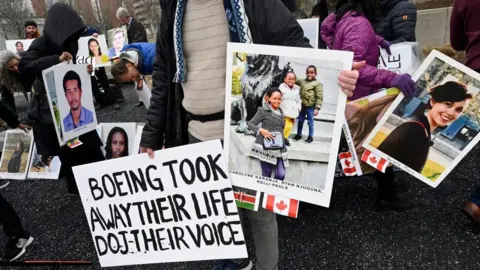 AFP via Getty Images
AFP via Getty ImagesBoeing will avoid a criminal charge in the US linked to two deadly 737 Max crashes, after a court granted a request from the US government to dismiss the criminal case.
In his ruling, Judge Reed O’Connor said he “disagreed” that dropping the charge was in the public interest but said his concerns did not give him sufficient reason to deny the proposal.
The decision marks a major win for Boeing, after the government last year accused it of violating a settlement related to the crashes, raising the threat of prosecution.
The dismissal had been opposed by some of the families of those killed in the accidents, who had sought to hold Boeing accountable at trial.
Lawyer Paul Cassell, who represents some of the families, said he intended to appeal against the ruling.
“We believe that the courts don’t have to stand silently by while an injustice is perpetrated,” he said in a statement.
In his decision on Thursday, Mr O’Connor said the government’s concerns about taking the charge to trial were “unserious” and he did not believe the new deal reached between the government and Boeing would “secure the necessary accountability to ensure the safety of the flying public”.
But he said the government was presumed to be acting in “good faith” and he did not have the authority to override the request.
The Department of Justice (DOJ) defended its agreement, noting that it had met “extensively” with the crash victims’ families, which had expressed “a broad set of views regarding the resolution”.
“Rather than allow for protracted litigation, this agreement provides finality for the victims and requires Boeing to act now,” a spokesperson said in a statement. “We are confident that this resolution is the most just outcome.”
Boeing said it was committed to the agreement struck with the DOJ.
“We are also committed to continuing the significant efforts we have made as a company to strengthen our safety, quality, and compliance programs,” the company said in a statement.
The decision marks the latest twist in a long-running legal battle stemming from two major 737 Max accidents in late 2018 off Indonesia and in Ethiopia in early 2019, which killed 346 people.
The US subsequently charged Boeing with one count of criminal fraud conspiracy, accusing Boeing of deliberately concealing from regulators key information about its flight control software, which was implicated in the crashes.
The firm admitted to the allegations but avoided prosecution with a 2021 deal in which it paid $2.5bn in fines and compensation and pledged to improve safety standards and compliance programmes.
The case was reopened last year, after an incident in which an unused door fell off a 737 Max early in flight. The DOJ accused Boeing of having breached the terms of the original settlement.
In 2024, under the Biden administration, the DOJ proposed a new deal in which Boeing would plead guilty to the fraud charge, pay a further fine of $243m and agree to a court-appointed monitor overseeing its operations for a set period.
But Mr O’Connor rejected that deal last December, in part due to concerns over how the monitor would be selected.
A new settlement put forward by prosecutors this year dropped the criminal charge, a black mark for Boeing that could have complicated its dealings with the government as a contractor.
It still required the company to hire an “independent compliance consultant” and make $1.1bn financial commitments, including another $243m in penalties as well as additional compensation to family members of those killed in the crashes.
In explaining their decision to dismiss the charge, prosecutors said Boeing had made “meaningful progress” this year in its anti-fraud and conspiracy programmes.
